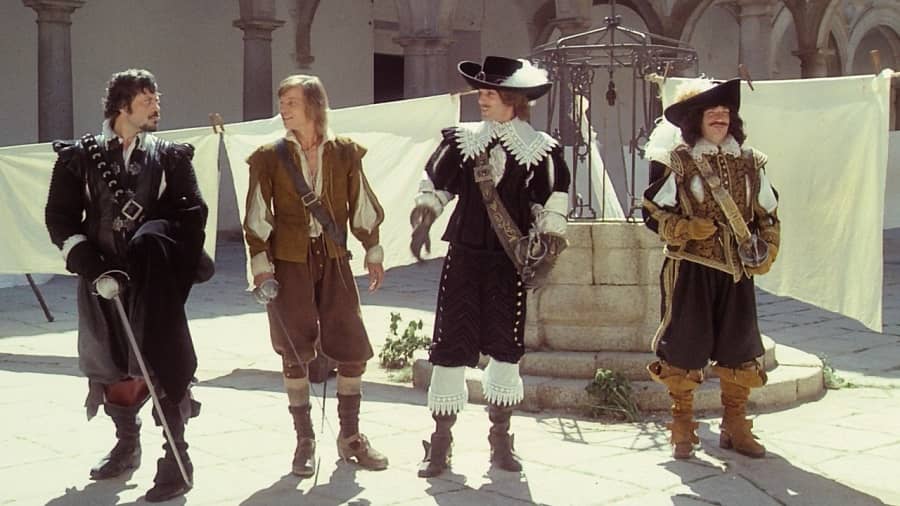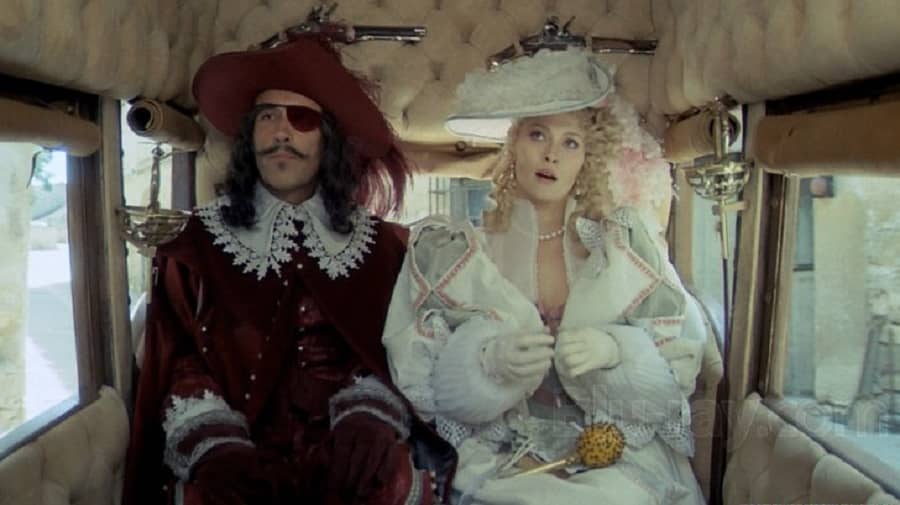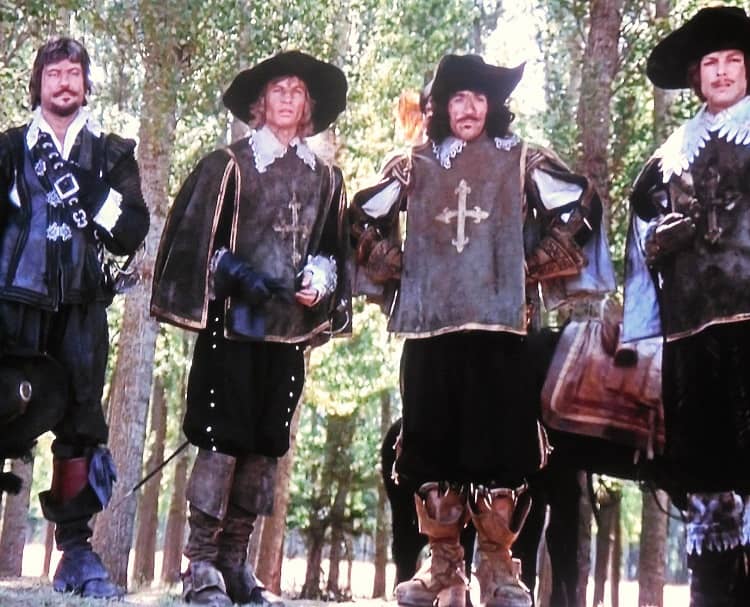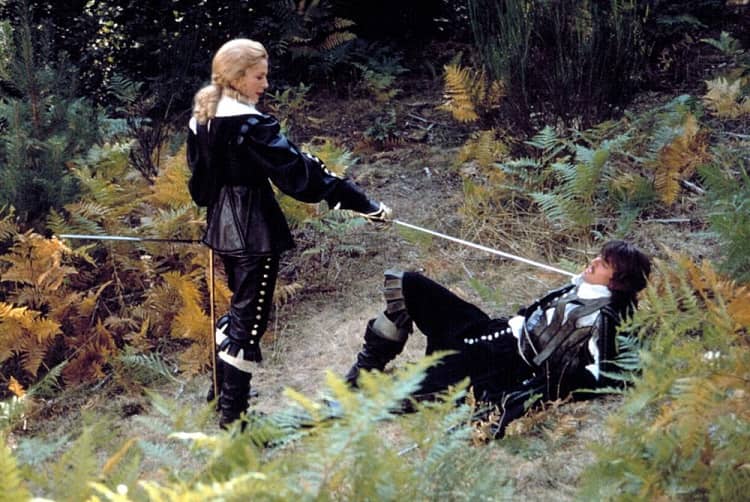Ellsworth’s Cinema of Swords: Peak Musketeers
The Three Musketeers (1973)
Richard Lester directed the best-ever screen version of Alexandre Dumas’s The Three Musketeers and the worst version of its sequel, Twenty Years After. Those films are discussed below, so let’s talk about Lester up here.
An American Jew from Philadelphia, Dick Lester had to go to the UK to make his mark in the movies, though he worked first in television, short subjects, and commercials. His early work was in comedy, and he was part of the gang of English comics that included Spike Milligan and Peter Sellers who created The Goon Show, a direct predecessor to Monty Python. John Lennon was a huge fan of the Goons and of Lester’s hilarious short, The Running Jumping & Standing Still Film, and Lester got his big break when he was tapped to direct the Beatles’ first feature, A Hard Day’s Night. This kicked off what you might call the Swinging London portion of Lester’s career, during which he made some of the funniest movies of the Sixties, including Help! (1965) and A Funny Thing Happened on the Way to the Forum (1966).
Lester made some anti-war films that were dogs at the box office and his career bogged down until his surprise second act as a director of action films, beginning, of course, with The Three and Four Musketeers. The resounding success of the musketeers movies was followed by more action movies, some better than others but all watchable: Royal Flash (1975), Robin and Marian (1976), Butch and Sundance: The Early Days (1979), Superman II (1980), and Superman III (1983). After a hiatus, he came back to swashbucklers with The Return of the Musketeers in 1989. It was not a success. Worse, Lester’s close friend, Roy Kinnear, who was playing d’Artagnan’s lackey Planchet, died during the shoot from complications due to a fall from a horse. Kinnear’s family sued Lester and the production company, accusing them of negligence and slipshod safety procedures. Lester, heartbroken, never made another full feature film; now 89, he lives in retirement.
I have to thank him here for his work, because without it I wouldn’t be writing this series.
The Three Musketeers (1973) (or The Queen’s Diamonds)
Rating: ***** (Essential)
Origin: UK/US, 1973
Director: Richard Lester
Source: Studio Canal Blu-ray
In the last 110 years or so, there have been dozens of screen adaptations of Alexandre Dumas’s greatest novel. This one is the best.
Director Richard Lester had shown a deft hand for comedy with A Funny Thing Happened on the Way to the Forum and the first two Beatles movies, and first thought about adapting T3M when it was briefly considered as a vehicle for the Fab Four. Lester re-read the novel and realized it offered much more to the screen than its comedic elements. In fact, it reminded him of Flashman, a humorous historical adventure novel that he’d also considered filming, and he hired its author, George MacDonald Fraser, to write a T3M screenplay. It was an inspired choice: Fraser understood T3M’s balance of adventure, suspense, comedy, and camaraderie, and wrote a script that captures all those elements, a screenplay so sharp and dynamic and with such juicy roles that top-notch actors clamored for the parts.
And what a cast it was, when finally assembled: Michael York as d’Artagnan, with the youth and activity the part demands and the acting chops of the stage-trained; the glowering Oliver Reed as Athos, the finest actor ever to fill that role; Charlton Heston, utterly convincing as the many-sided Cardinal Richelieu; Christopher Lee as his arrogant and ruthless hatchet man, Rochefort; Raquel Welch, showing an unexpected talent for slapstick as d’Artagnan’s love Constance; and a dozen more, including Faye Dunaway, Richard Chamberlain, Geraldine Chaplin, Spike Milligan, Simon Ward, and Roy Kinnear, all perfectly cast for their parts, large or small.
The costumes and sets, even fifty years later, are simply astonishing. One of the reasons this film is endlessly rewatchable is that there is just so much going on, nearly every scene jammed with historical details, every character fully alive, every activity in street, tavern, or royal court fascinating. Pomanders, dog chess, torturers cooking potatoes in their braziers, tavern games, street dentists, cupping, hawking, it goes on and on.
The action, and there’s plenty of it, is both comical and thrilling, usually at the same time. Every fight, for love or for glory, is a perfectly choreographed roughhouse brawl arranged by dueling master William Hobbs, with all of the gratuitous acrobatics we expect from d’Artagnan and company. The night duel in the forest between d’Artagnan and Rochefort, both using dark-lanterns, could have been filmed by Terry Gilliam.
The novel, of course, is big and packed with plot, and Lester originally intended to make a three-and-a-half-hour epic complete with intermission like El Cid. But when it became clear that approach was no longer commercially viable, it was split into two films, The Three Musketeers (The Queen’s Diamonds) and The Four Musketeers (The Revenge of Milady), released the following year. (Famously, the actors, who’d been paid for only one film, sued the production company, and a clause forbidding the splitting practice became standard in the industry thereafter.)
Crucially, Lester’s T3M revitalized the entire genre of the swashbuckler movie, sharpening the action and modernizing the dialogue while winking at the clichés and turning new twists on the old tropes. It was an approach George Lucas would use to good effect several years later in a film called Star Wars.
The Four Musketeers (or The Revenge of Milady)
Rating: ***** (Essential)
Origin: UK, 1974
Director: Richard Lester
Source: Studio Canal Blu-ray
This is the sequel to The Three Musketeers(1973), the second half of a two-part adaptation of Alexandre Dumas’s greatest novel. The first half of the book, the tale of the queen’s diamonds, is largely a self-contained story that ends on a triumph, so it’s understandable that screen adaptations often confine themselves to just that part of the saga. The novel’s second half is more complicated, darker in tone, and its ending is bittersweet, so it’s rare for it to get the full cinematic treatment, as it does here. This is a reasonably close adaptation, and if screenwriter George MacDonald Fraser takes more liberties with the plot than he did with the first half, it’s understandable. Some of his changes are actually improvements that rectify plot flaws in the original, clarifying and tightening.
Though the story in T4M jumps around more and is less cohesive than in T3M, the second film contains a number of scenes that are more intense and memorable than any in the first. The scenes involving Athos and Milady are the standouts here, as Oliver Reed and Faye Dunaway walk away with the movie. Dunaway didn’t get much screen time in T3M, but her performance here more than makes up for that, subtle and layered, simultaneously sinister and affecting, and Reed is her mirror-image, wounded and vengeful. “I knew a man once….”
As mentioned above, the tone is darker this time ‘round: France and England are going to war, the stakes in the game are higher, and the loss of a hand means somebody dies. The action sequences are just as inventive as in T3M, exciting but with touches of comedy. One of the best scenes in the novel, the siege of the St. Gervais bastion where the musketeers have breakfast on a battlefield while secretly discussing the threat of Milady, is marvelously rendered; that chapter rarely makes it into film adaptations, but it receives the full treatment here.
Best of all is the final extended fight at the convent of Armentières between the musketeers and a full dozen of the Cardinal’s Guards, a scene that isn’t even in the book, added here to provide a final showdown with the Comte de Rochefort (Christopher Lee). First Rochefort duels Athos, and it’s a delight to see the old Hammer Films compatriots Lee and Reed going at it hammer and tongs. The final battle between Rochefort and the enraged d’Artagnan (Michael York), who’s just come from discovering the corpse of his beloved Constance (Raquel Welch), is just tremendous: staged in the nave of the chapel, in sunbeams tinted by the stained glass in the great rose window, the two men, nearly dead from fatigue, flail away at each other in desperate fury until finally d’Artagnan gets his revenge.
Of course, the great Cardinal Richelieu (Charlton Heston) gets the last word. In his final scene, in which he ruefully acknowledges that he’s lost the game to d’Artagnan and his comrades, the cardinal-duke lives up to the acid advice he’d given Milady earlier in the film: “If you should lose, do it with a becoming grace.”
The Return of the Musketeers
Rating: ***
Origin: UK/France/Spain, 1989
Director: Richard Lester
Source: Universal DVD
This is the belated sequel to The Three and Four Musketeers of 1973-74, those highlights of director Richard Lester’s career, an attempt to recapture the magic of those films with the same writer and largely the same cast as the originals. There have been scores of screen versions of The Three Musketeers, but Dumas’s sequel, Twenty Years After, is rarely filmed, as its broad scope and wide-ranging plot aren’t easily shoe-horned into the feature film format.
Reviews often refer to Return as a “loose” adaptation of the novel, but actually George MacDonald Fraser’s script is remarkably faithful to Dumas’s story. And that faithfulness is where it goes wrong, because trying to jam the whole book, plus new scenes featuring Cyrano de Bergerac (added, apparently, just because he could), into less than two hours was a big mistake.
Fraser is one of my literary heroes, but he’s blundered badly here; where his adaptation of The Three Musketeers unrolls across two movies and four hours at just the right pace for the material, Return is rushed and confused, and even has added (and awkward) voiceover narration by d’Artagnan here and there to try to explain what the hell is going on. That kind of desperate ploy in a movie is nearly always an admission of storytelling failure, and it doesn’t succeed here.
The original films were a near-perfect balance of drama and comedy, of action and character scenes, tense where they needed to feel dangerous and loose when conveying the happy camaraderie of the heroes. Here the balance is off, leaning too heavily on slapstick, which often feels forced and just isn’t very funny. Reprising their roles as d’Artagnan, Aramis, and Porthos, Michael York, Richard Chamberlain, and Frank Finlay all seem vaguely embarrassed at being involved in what amounts to tiresome self-parody. Even the usually unflappable Christopher Lee, returning as Rochefort, seems to be wondering what he’s doing in this thing. Only Oliver Reed plays his part with conviction, and as a result his Athos is the anchor to the whole picture. Reed is spot on, never lets up, and has more stature and gravitas than the rest of the cast put together.
The plot isn’t easily summarized; suffice to say it involves the musketeers in exploits in civil wars in both France and England, while they try to avoid falling prey to the vengeful assassination attempts of Justine de Winter (Kim Cattrall), the now-grown daughter of Milady, arch-villain of the original films. Athos’s adopted son Raoul (C. Thomas Howell) is thrown in to the mix to provide a love/hate interest for Justine, but he’s barely fleshed out, and his character is just as much a stuffed shirt as he is in Dumas’s later novels.
The less said about Howell’s acting the better, and while Cattrall is energetic, she doesn’t have a tenth the screen presence of Faye Dunaway as Milady. Even the swordplay is off: though the fights are arranged by the great Bill Hobbs, who did the original films (and is still working today, recently on Game of Thrones),
Lester seems to have lost the touch for desperate mayhem that served him so well in Robin and Marian and the first Musketeers films. Once in a while there are flashes of his former greatness, as in the woodland encounter between Justine and Raoul, reminiscent of Ridley Scott’s work in The Duellists. And there’s one great character scene near the end where Athos and Aramis finally get the better of the wily Cardinal Mazarin (Philippe Noiret) and extort from him the musketeers’ long-overdue rewards. But mostly this movie will just make you want to go back and revisit those career-defining masterpieces whose magic it tries — and fails — to recapture.
Where can I watch these movies? I’m glad you asked! Many movies and TV shows are available on disk in DVD or Blu-ray formats, but nowadays we live in a new world of streaming services, more every month it seems. However, it can be hard to find what content will stream in your location, since the market is evolving and global services are a patchwork quilt of rights and availability. I recommend JustWatch.com, a search engine that scans streaming services to find the title of your choice. Give it a try. And if you have a better alternative, let us know.
SOME NEWS: This seems like an appropriate time and place to announce that Between Two Kings, Book Five in Alexandre Dumas’s Musketeers Cycle, is now available in the US, UK, and Canada. Between Two Kings is the first volume of Lawrence Ellsworth’s new translation of Dumas’s mega-novel Le Vicomte de Bragelonne, and will be followed by Court of Daggers, Devil’s Dance, Shadow of the Bastille, and the finale, The Man in the Iron Mask.
Previous installments in the Cinema of Swords include:
Flynn’s Last Flourishes
Mighty Colossi And Hydrae
Rejecting Bushido (Part One)
Pirates — Italian Style
The Year of Camelot and Scarecrows
Rejecting Bushido (Part Two)
The Fall of the Hollywood Epic
Cheh’s On Second
En Garde, Old Boy
More Hammer Historicals
Zatoichi’s Finest
A Little History
Lone Wolf and Cub, Part I
Premium Peplum
The Book Was Better
Shogunate’s End
LAWRENCE ELLSWORTH is deep in his current mega-project, editing and translating new, contemporary English editions of all the works in Alexandre Dumas’s Musketeers Cycle, with the fifth volume, Between Two Kings, coming in July from Pegasus Books in the US and UK. His website is Swashbucklingadventure.net.
Ellsworth’s secret identity is game designer LAWRENCE SCHICK, who’s been designing role-playing games since the 1970s. He now lives in Dublin, Ireland, where he’s writing Dungeons & Dragons scenarios for Larian Studios’ Baldur’s Gate 3.




I saw these films – ie, the first two – around the time they came out. They were utterly enthralling. After reading the book many years later, I was struck by how Lester/Fraser introduced a comedic element without compromising the original story.* I think both films were shot pretty quickly (in Spain?) which might explain the breathless pace but also why all the various components fuse together so well.
* I think Milady’s execution is pretty much as it is described in the book – poignant but deserved – but in the film this mood is then undercut by the executioner looking for his money. Not sure about either as I haven’t seen the film in over forty years or read the book in thirty!
The best. No question. I couldn’t say how many times I’ve watched T3M and T4m. As much of an admirer of Fraser as I am, his screenplays were hit and miss (Red Sonja, anyone?) But his work here was nonpareil.
Saw the Four Musketeers as a little kid but don’t remember it well but liked it a lot.
Back in the mid-80s my family had a video disc player (not a laser disc player, but an older more archaic technology) and one of the first movies we got for it was Lester’s “Three Musketeers” and a couple of years later we got “The Four Musketeers”.
I must have watched those movies a dozen times each! And I agree with you they are the best T3M movies ever. Great action (but realistic action), great pacing, great humor and pathos.
I think I caught part of “20 years later” on TV and was not impressed.
Another Ellsworth’s Cinema of Swords? How did I miss that?
I saw the first of these films at least 3 times in the theatre when it came out in 1973; my buddies and I thought it was just about perfect and my opinion hasn’t changed. I enjoyed the 2nd film and endured the 3rd but that first one…Peak Musketeer indeed.
Thank you, Mr. Ellsworth.